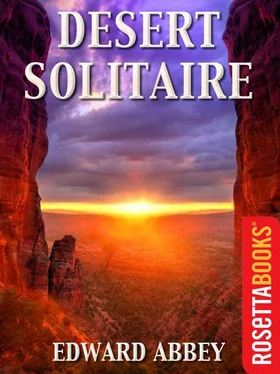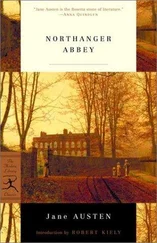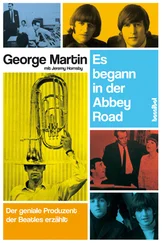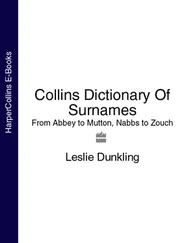Abbey, Edward - Desert Solitaire (Edward Abbey Series )
Здесь есть возможность читать онлайн «Abbey, Edward - Desert Solitaire (Edward Abbey Series )» — ознакомительный отрывок электронной книги совершенно бесплатно, а после прочтения отрывка купить полную версию. В некоторых случаях можно слушать аудио, скачать через торрент в формате fb2 и присутствует краткое содержание. Год выпуска: 2011, Издательство: RosettaBooks, Жанр: Старинная литература, на английском языке. Описание произведения, (предисловие) а так же отзывы посетителей доступны на портале библиотеки ЛибКат.
- Название:Desert Solitaire (Edward Abbey Series )
- Автор:
- Издательство:RosettaBooks
- Жанр:
- Год:2011
- ISBN:нет данных
- Рейтинг книги:4 / 5. Голосов: 1
-
Избранное:Добавить в избранное
- Отзывы:
-
Ваша оценка:
- 80
- 1
- 2
- 3
- 4
- 5
Desert Solitaire (Edward Abbey Series ): краткое содержание, описание и аннотация
Предлагаем к чтению аннотацию, описание, краткое содержание или предисловие (зависит от того, что написал сам автор книги «Desert Solitaire (Edward Abbey Series )»). Если вы не нашли необходимую информацию о книге — напишите в комментариях, мы постараемся отыскать её.
Desert Solitaire (Edward Abbey Series ) — читать онлайн ознакомительный отрывок
Ниже представлен текст книги, разбитый по страницам. Система сохранения места последней прочитанной страницы, позволяет с удобством читать онлайн бесплатно книгу «Desert Solitaire (Edward Abbey Series )», без необходимости каждый раз заново искать на чём Вы остановились. Поставьте закладку, и сможете в любой момент перейти на страницу, на которой закончили чтение.
Интервал:
Закладка:
A hot day. Delicate, wind-whipped clouds flow across the burning blue, moving in perfect unison like the fish in the pools below. I stop at one of the largest of these pools, undress and plunge in. Happily I flounder about, terrifying the minnows, and float on my back and spout cheekfuls of water at the sun.
On to the Bridge:
I come to a fork in the canyon, the main branch continuing to the right, a deep dark narrow defile opening to the left. There are no trail markers but even on the naked sandstone I can make out the passage of human feet, boot-shod, leading into the unlikely passage on the left. And so I follow.
Here too a stream is flowing, much smaller than the other, through smoothly sculptured grooves, scoops and potholes in the rock. I go by the dripping little springs that feed it and the stream diminishes to a rill, to a trickle, to a series of stagnant waterholes shrinking under the sun. Frogs and toads will be croaking here, fireflies winking, when I return.
Hot and tired I stop in the shade of an overhanging ledge and take a drink from my canteen. Resting, I listen to the deep dead stillness of the canyon. No wind or breeze, no birds, no running water, no sound of any kind but the stir of my own breathing.
Alone in the silence, I understand for a moment the dread which many feel in the presence of primeval desert, the unconscious fear which compels them to tame, alter or destroy what they cannot understand, to reduce the wild and prehuman to human dimensions. Anything rather than confront directly the antehuman, that other world which frightens not through danger or hostility but in something far worse—its implacable indifference.
Out of the shade, into the heat. I tramp on through the winding gorge, through the harsh brittle silence. In this arid atmosphere sounds do not fade, echo or die softly but are extinguished suddenly, sharply, without the slightest hint of reverberation. The clash of rock against rock is like a shot—abrupt, exaggerated, toneless.
I round the next bend in the canyon and all at once, quite unexpectedly, there it is, the bridge of stone.
Quite unexpectedly , I write. Why? Certainly I had faith, I knew the bridge would be here, against all odds. And I knew well enough what it would look like—we’ve all seen the pictures of it a hundred times. Nor am I disappointed in that vague way we often feel, coming at last upon a long-imagined spectacle. Rainbow Bridge seems neither less nor greater than what I had foreseen.
My second sensation is the feeling of guilt. Newcomb. Why did I not insist on his coming? Why did I not grab him by the long strands of his savage beard and haul him up the trail, bearing him when necessary like Christopher would across the stream, stumbling from stone to stone, and dump him finally under the bridge, leaving him there to rot or to crawl back to the river if he could? No man could have asked for a lovelier defenestration.
Through God’s window into eternity.
Oh well. I climb to the foot of the east buttress and sign for Ralph and myself in the visitors’ register. He is the 14,467th and I the next to enter our names in this book since the first white men came to Rainbow Bridge in 1909. Not many, for a period of more than half a century, in the age above all of publicity. But then it’s never been an easy journey. Until now.
The new dam, of course, will improve things. If ever filled it will back water to within sight of the Bridge, transforming what was formerly an adventure into a routine motorboat excursion. Those who see it then will not understand that half the beauty of Rainbow Bridge lay in its remoteness, its relative difficulty of access, and in the wilderness surrounding it, of which it was an integral part. When these aspects are removed the Bridge will be no more than an isolated geological oddity, an extension of that museumlike diorama to which industrial tourism tends to reduce the natural world.
All things excellent are as difficult as they are rare, said a wise man. If so, what happens to excellence when we eliminate the difficulty and the rarity? Words, words—the problem makes me thirsty. There is a spring across the canyon, another seep under a ledge below the west footing of the Bridge. I climb down and up the other side and help myself to one of the tins someone has left there, collecting water under the dripping moss.
The heat is stunning. I rest for a while in the shade, dream and sleep through the worst of the midday glare. When the sun passes beyond the rim I get up and start to return to Newcomb and our camp.
But am diverted by a faint pathway which looks as if it might lead up out of the canyon, above Rainbow Bridge. Late afternoon, the canyon filling with shadows—I should not try it. I take it anyway, climbing a talus slope and then traversing a long inclined bench that pinches out in thin air at the base of a higher cliff. Impossible to go on—but a fixed rope dangles there, hanging from some belaying point out of sight above. I test the rope, it seems to be well anchored, and with its help and a few convenient toeholds and fingerholds I work my way to the top of the pitch. From there it’s a long but easy scramble to the rim of the canyon.
Now I am in the open again, out of the underworld. From up here Rainbow Bridge, a thousand feet below, is only a curving ridge of sandstone of no undue importance, a tiny object lost in the vastness and intricacy of the canyon systems which radiate from the base of Navajo Mountain. Of more interest is the view to the north, east and west, revealing the general lay of the land through which we have voyaged in our little boats.
The sun, close to the horizon, shines through the clear air beneath the cloud layers, illuminating in soft variations of rose, vermillion, umber, slate-blue, the complex features and details, defined sharply by shadow, of the Glen Canyon landscape. I can see the square-edged mesas beyond the junction of the San Juan and Colorado, the plateau-mountains of south-central Utah, and farthest away, a hundred miles or more by line of sight, the five peaks of the Henry Mountains, including Mount Ellsworth near Hite where our journey began.
Off in the east an isolated storm is boiling over the desert, a mass of lavender clouds bombarding the earth with lightning and trailing curtains of rain. The distance is so great that I cannot hear the thunder. Between here and there and me and the mountains is the canyon wilderness, the hoodoo land of spire and pillar and pinnacle where no man lives, and where the river flows, unseen, through the blue-black trenches in the rock.
Light. Space. Light and space without time, I think, for this is a country with only the slightest traces of human history. In the doctrine of the geologists with their scheme of ages, eons and epochs all is flux, as Heraclitus taught, but from the mortally human point of view the landscape of the Colorado is like a section of eternity—timeless. In all my years in the canyon country I have yet to see a rock fall, of its own volition, so to speak, aside from floods. To convince myself of the reality of change and therefore time I will sometimes push a stone over the edge of a cliff and watch it descend and wait—lighting my pipe—for the report of its impact and disintegration to return. Doing my bit to help, of course, aiding natural processes and verifying the hypotheses of geological morphology. But am not entirely convinced.
Men come and go, cities rise and fall, whole civilizations appear and disappear—the earth remains, slightly modified. The earth remains, and the heartbreaking beauty where there are no hearts to break. Turning Plato and Hegel on their heads I sometimes choose to think, no doubt perversely, that man is a dream, thought an illusion, and only rock is real. Rock and sun.
Читать дальшеИнтервал:
Закладка:
Похожие книги на «Desert Solitaire (Edward Abbey Series )»
Представляем Вашему вниманию похожие книги на «Desert Solitaire (Edward Abbey Series )» списком для выбора. Мы отобрали схожую по названию и смыслу литературу в надежде предоставить читателям больше вариантов отыскать новые, интересные, ещё непрочитанные произведения.
Обсуждение, отзывы о книге «Desert Solitaire (Edward Abbey Series )» и просто собственные мнения читателей. Оставьте ваши комментарии, напишите, что Вы думаете о произведении, его смысле или главных героях. Укажите что конкретно понравилось, а что нет, и почему Вы так считаете.












